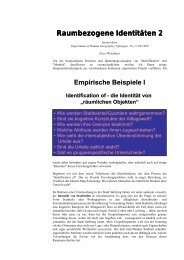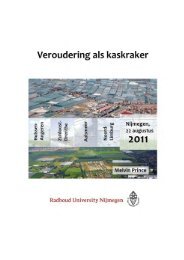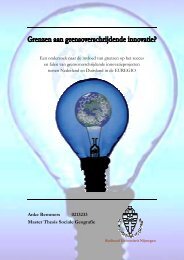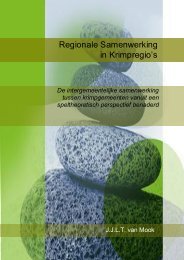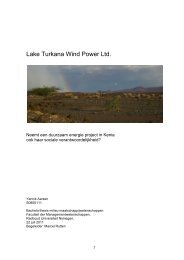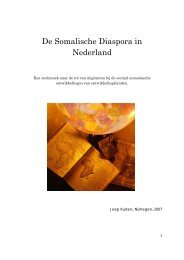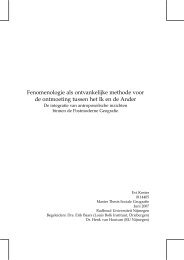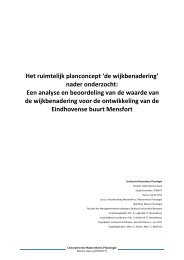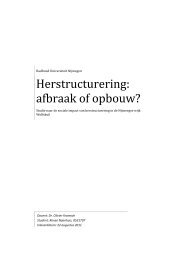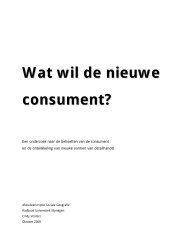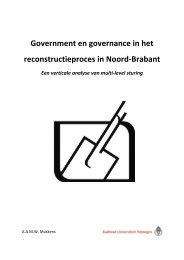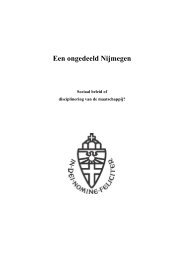Trading with the enemy in Mitrovica, Kosovo. - RUhosting
Trading with the enemy in Mitrovica, Kosovo. - RUhosting
Trading with the enemy in Mitrovica, Kosovo. - RUhosting
You also want an ePaper? Increase the reach of your titles
YUMPU automatically turns print PDFs into web optimized ePapers that Google loves.
CHAPTER 7: CONCLUSION<br />
"As far as Danijela is concerned, it is self-<strong>in</strong>terest and,<br />
<strong>in</strong> particular, <strong>the</strong> lure of bus<strong>in</strong>ess that will eventually<br />
coax Serbs out of <strong>the</strong>ir ghetto and <strong>in</strong>to a more<br />
<strong>in</strong>tegrated existence <strong>with</strong> <strong>the</strong>ir ethnic-Albanian<br />
neighbours. "Nobody can live <strong>in</strong> isolation for ever," she<br />
<strong>in</strong>sists. "To improve our liv<strong>in</strong>g standards, Serbs will<br />
start trad<strong>in</strong>g more. And naturally, open<strong>in</strong>g of <strong>the</strong> market<br />
is go<strong>in</strong>g to open <strong>the</strong> m<strong>in</strong>ds of people." "We will stop<br />
th<strong>in</strong>k<strong>in</strong>g about ethnicities, stop divid<strong>in</strong>g ourselves as we<br />
are divided now," she adds".<br />
-BBC News, 29 July 2009 22<br />
From <strong>the</strong> research results I conclude that <strong>in</strong>ter-ethnic trade does have <strong>the</strong> potential to improve relations<br />
between Albanians and Serbs <strong>in</strong> <strong>the</strong> long run. These last few words may sound pessimistic, but are <strong>in</strong> fact <strong>the</strong><br />
strength of trade over more traditional reconciliation methods. It has been described how so far reconciliation<br />
programmes have failed at achiev<strong>in</strong>g results, ma<strong>in</strong>ly because of <strong>the</strong> negativity of <strong>the</strong> local population<br />
regard<strong>in</strong>g <strong>the</strong>m and <strong>the</strong>ir short run. These obstacles are both avoided by <strong>in</strong>ter-ethnic trade. People have no<br />
negative attitudes aga<strong>in</strong>st trade as everyone understands <strong>the</strong> need to make money. Improv<strong>in</strong>g <strong>the</strong> relations<br />
between two ethnic groups who experienced decades of hostility between <strong>the</strong>m and most notably a civil war<br />
should be expected to last very long. S<strong>in</strong>ce reconciliation programmes only last for a short period this is one<br />
of <strong>the</strong> reasons for lack of success. Trade however, generally builds relations that last for many years. This can<br />
be seen by <strong>the</strong> fact that all three traders <strong>in</strong>terviewed had been trad<strong>in</strong>g for over 8 years <strong>with</strong> “<strong>the</strong> o<strong>the</strong>r”,<br />
despite <strong>the</strong> difficult circumstances. As both local as well as <strong>in</strong>ternational experts told me: trade builds<br />
prolonged contact and trust. Trust is <strong>the</strong> most lack<strong>in</strong>g aspect <strong>in</strong> <strong>in</strong>ter-ethnic relations right now. Trade<br />
requires trust, because <strong>with</strong>out trust you cannot successfully engage <strong>in</strong> trade for a longer period of time. This<br />
can be seen by <strong>the</strong> responses by traders, <strong>the</strong>y all completely trusted <strong>the</strong>ir counterparts on <strong>the</strong> o<strong>the</strong>r side of <strong>the</strong><br />
river, at least <strong>with</strong><strong>in</strong> trade. Both locals and <strong>in</strong>ternationals believed that this trade - which comes down to<br />
prolonged friendly contact <strong>in</strong> a trust<strong>in</strong>g environment – would improve <strong>in</strong>ter-ethnic relations over a longer<br />
period of time. It would allow people to see that peaceful relations are possible and this can slowly decrease<br />
<strong>the</strong> <strong>enemy</strong> image people currently have of “<strong>the</strong> o<strong>the</strong>r”. Whe<strong>the</strong>r or not <strong>the</strong>se traders still hate each o<strong>the</strong>r<br />
based on each o<strong>the</strong>r's ethnicity is <strong>in</strong> this sense not even that relevant – beneficial trade relations make sure<br />
<strong>the</strong>y keep relations peaceful. It is unlikely that <strong>the</strong> traders hate each o<strong>the</strong>r however, although it is difficult to<br />
say much about this because of my lack of data on <strong>the</strong> attitudes of traders regard<strong>in</strong>g <strong>the</strong>ir colleagues s<strong>in</strong>ce<br />
<strong>the</strong>y simply did not want to answer this question. It seemed that relations were not bad, as two of <strong>the</strong> three<br />
traders admitted to socialis<strong>in</strong>g <strong>with</strong> <strong>the</strong>ir colleagues, despite <strong>the</strong> risk of sanctions from <strong>the</strong>ir own community.<br />
It is certa<strong>in</strong>ly a possibility that <strong>the</strong> traders did not want to answer <strong>the</strong> question regard<strong>in</strong>g <strong>the</strong>ir attitudes<br />
22<br />
BBC News. Isolation fear grips <strong>Kosovo</strong> Serbs, by Paul Moss. 29 July 2009. Visited on 24-10-2009.<br />
http://news.bbc.co.uk/2/hi/europe/8172537.stm<br />
77



